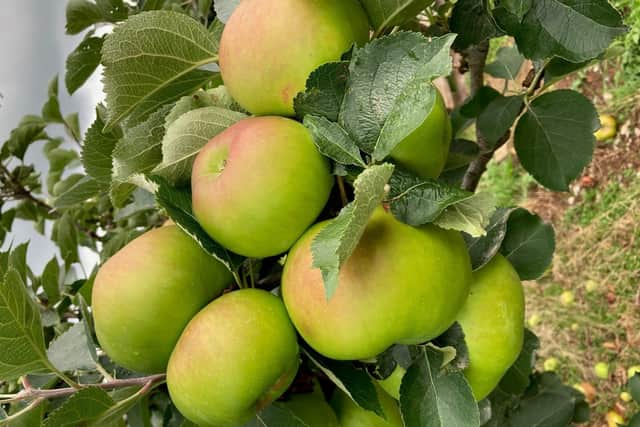The most important harvest of all


Bramley apples are grown commercially on over 100 farms in Northern Ireland, concentrated in the Loughgall area, which has a micro-climate of higher temperatures, lower rainfall and fewer frosts than most parts of the country.
On some farms, apple growing is the main enterprise and in an average year 50,000 tonnes are produced with a farm gate value of £12 million. The apple sector supports a considerable work force, not just on fruit farms, but also in the local fruit factories. The Armagh Bramley has protected marketing status and is packed for the retail sector, processed into pie fillings, or pressed to make juices and cider.
Advertisement
Advertisement
In recent years the introduction of dwarf trees, which are fully grown at about 2 metres, has made the job of pruning and harvesting easier. These newer style orchards produce fruit even in their first year of planting, starting to generate some return on the high cost of establishment, which is currently around £10,000 per acre.


Throughout the spring and summer months, the orchards are regularly sprayed to control pests and diseases and many of the nutrients are also applied by spray. As Bramley apples are very prone to bruising, they are all hand harvested, a labour-intensive job, carried out in September and October. A proportion of the harvest is put into specialised cold stores, where the apples can be kept for up to a year.
All Bramley trees have been propagated from the original Bramley tree, which was planted in the early part of the 19th century, and still exists today in a garden in Southwell, Nottinghamshire. Bramley fruit have a distinctive taste, colour and the shape and the trees can be recognised by their bare wood and structure in winter.
This reminds us of words spoken by Jesus in Matthew 7, when he was speaking to people who were familiar with fruit growing. In verse 15 the Lord Jesus warned us to beware of false prophets, who will come to us “in sheep’s clothing but inwardly are ferocious wolves.”
Advertisement
Advertisement
Sadly, in our modern society there are many who promote false doctrine and strange beliefs, which are not based upon the Bible. The Lord Jesus goes on to warn us in verse 16 when He says, “By their fruit you will recognise them. Do people pick grapes from thorn bushes, or figs from thistles?”
Keeping with the agri theme, a very important aspect of apple growing is pruning, which takes place mainly in winter. This requires the grower to thoroughly inspect each tree and cut out any diseased or misshapen branches, which will not produce good fruit. In Matthew 7:19, Jesus continues when He says that “every tree which does not bear good fruit is cut down and thrown into the fire.” This is a stark reminder to each of us that we need to be prepared for the day when we all stand before God.
Just as apple growers put a lot of effort into preparing their orchards for harvest, we too need to be well prepared for what is to come. As the Prophet Isaiah (55:6) says, “Seek the Lord while He may be found; call on Him while he is near...” We need to ensure that we have accepted Christ’s offer of salvation, that He has forgiven our sins, and prepared us for that most important and final harvest.
David Johnston worked for over 30 years in the Grass Breeding department at AFBI Loughgall. Since his retirement, David grows Bramley cooking apples, supplying these to local retailers and apple processors. He is a past president of the Ulster Grassland Society, the current chairman of the Northern Ireland Fruit Growers’ Association, and a member of the UFU Executive. David is an elder in Loughgall Presbyterian Church.
If you would like to talk to someone about any of the subjects raised in this article, please email Rev Kenny Hanna at [email protected] or call him on 028 9753 1234.